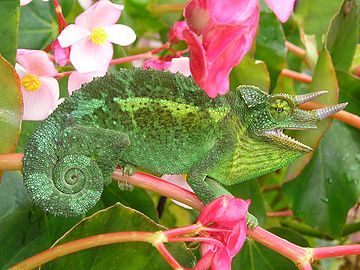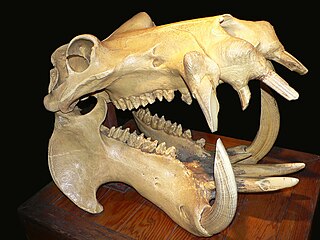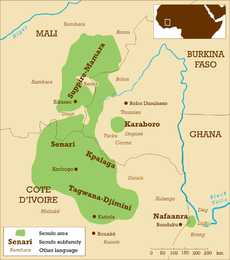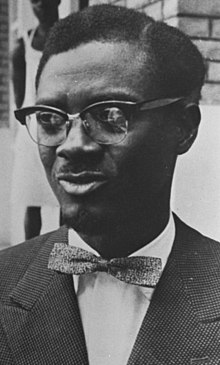Portal:Africa



Africa is the world's second-largest and second-most populous continent after Asia. At about 30.3 million km2 (11.7 million square miles) including adjacent islands, it covers 20% of Earth's land area and 6% of its total surface area. With nearly 1.4 billion people as of 2021, it accounts for about 18% of the world's human population. Africa's population is the youngest among all the continents; the median age in 2012 was 19.7, when the worldwide median age was 30.4. Based on 2024 projections, Africa's population will reach 3.8 billion people by 2099. Africa is the least wealthy inhabited continent per capita and second-least wealthy by total wealth, ahead of Oceania. Scholars have attributed this to different factors including geography, climate, corruption, colonialism, the Cold War, and neocolonialism. Despite this low concentration of wealth, recent economic expansion and a large and young population make Africa an important economic market in the broader global context. Africa has a large quantity of natural resources and food resources, including diamonds, sugar, salt, gold, iron, cobalt, uranium, copper, bauxite, silver, petroleum, natural gas, cocoa beans, and.
Africa straddles the equator and the prime meridian. It is the only continent to stretch from the northern temperate to the southern temperate zones. The majority of the continent and its countries are in the Northern Hemisphere, with a substantial portion and a number of countries in the Southern Hemisphere. Most of the continent lies in the tropics, except for a large part of Western Sahara, Algeria, Libya and Egypt, the northern tip of Mauritania, and the entire territories of Morocco, Ceuta, Melilla, and Tunisia, which in turn are located above the tropic of Cancer, in the northern temperate zone. In the other extreme of the continent, southern Namibia, southern Botswana, great parts of South Africa, the entire territories of Lesotho and Eswatini and the southern tips of Mozambique and Madagascar are located below the tropic of Capricorn, in the southern temperate zone.
Africa is highly biodiverse; it is the continent with the largest number of megafauna species, as it was least affected by the extinction of the Pleistocene megafauna. However, Africa also is heavily affected by a wide range of environmental issues, including desertification, deforestation, water scarcity, and pollution. These entrenched environmental concerns are expected to worsen as climate change impacts Africa. The UN Intergovernmental Panel on Climate Change has identified Africa as the continent most vulnerable to climate change.
The history of Africa is long, complex, and varied, and has often been under-appreciated by the global historical community. In African societies the oral word is revered, and they have generally recorded their history via oral tradition, which has led anthropologists to term them oral civilisations, contrasted with literate civilisations which pride the written word. During the colonial period, oral sources were deprecated by European historians, which gave them the impression Africa had no recorded history. African historiography became organized at the academic level in the mid-20th century, and saw a movement towards utilising oral sources in a multidisciplinary approach, culminating in the General History of Africa, edited by specialists from across the continent. (Full article...)
Selected article –
The Chilembwe uprising was a rebellion against British colonial rule in Nyasaland (modern-day Malawi) which took place in January 1915. It was led by John Chilembwe, an American-educated Baptist minister. Based around his church in the village of Mbombwe in the south-east of the colony, the leaders of the revolt were mainly from an emerging black middle class. They were motivated by grievances against the British colonial system, which included forced labour, racial discrimination and new demands imposed on the African population following the outbreak of World War I.
The revolt broke out in the evening of 23 January 1915 when rebels, incited by Chilembwe, attacked the headquarters of the A. L. Bruce Estates at Magomero and killed three white settlers. A largely unsuccessful attack on a weapons store in Blantyre followed during the night. By the morning of 24 January, the colonial authorities had mobilised the Nyasaland Volunteer Reserve (NVR) and called in regular troops from the King's African Rifles (KAR). After a failed attack by KAR troops on Mbombwe on 25 January, the rebels attacked a Christian mission at Nguludi and burned it down. The KAR and NVR captured Mbombwe without encountering any resistance on 26 January. Many of the rebels, including Chilembwe himself, fled towards Portuguese Mozambique, hoping to reach safety there, but many were captured. About 40 rebels were executed in the revolt's aftermath, and 300 were imprisoned; Chilembwe was shot dead by a police patrol near the border on 3 February. (Full article...)
Featured pictures –
Did you know (auto-generated) -

- ... that the Bethel African Methodist Episcopal Church in Springtown, New Jersey, was used by Harriet Tubman to help fugitive slaves escape?
- ... that African porters in Salvador, Bahia, went on strike after the provincial government passed a law requiring them to wear metal identification tags?
- ... that The Red Moon was the first Broadway show to depict alliances between African Americans and Native Americans?
- ... that Freedom of Religion South Africa filed an unsuccessful lawsuit to keep child spanking legal?
- ... that Albert Luthuli was the first African to win the Nobel Peace Prize?
- ... that William H. Davis was the first teacher of Booker T. Washington and the first African American to be nominated as a candidate for West Virginia governor in 1888?
Categories
Selected biography –
Patrice Émery Lumumba (/pəˈtriːs lʊˈmʊmbə/ pə-TREESS luu-MUUM-bə; born Isaïe Tasumbu Tawosa; 2 July 1925 – 17 January 1961) was a Congolese politician and independence leader who served as the first prime minister of the Democratic Republic of the Congo (then known as the Republic of the Congo) from June until September 1960, following the May 1960 election. He was the leader of the Congolese National Movement (MNC) from 1958 until his assassination in 1961. Ideologically an African nationalist and pan-Africanist, he played a significant role in the transformation of the Congo from a colony of Belgium into an independent republic.
Shortly after Congolese independence in June 1960, a mutiny broke out in the army, marking the beginning of the Congo Crisis. After a coup, Lumumba attempted to escape to Stanleyville to join his supporters who had established a new anti-Mobutu state called the Free Republic of the Congo. Lumumba was captured en route by state authorities under Joseph-Désiré Mobutu, sent to the State of Katanga and, with the help of Belgian partisans, tortured and executed by the separatist Katangan authorities of Moïse Tshombe. He was seen as a martyr for the pan-African movement. In 2002, Belgium formally apologised for its role in the execution. (Full article...)
Selected country –
 |
 |
||

| |||
Malawi, officially the Republic of Malawi (formerly Nyasaland), is a country in southeastern Africa. It borders Zambia to the north-west, Tanzania to the north, and Mozambique to the east, south, and west.
The Great Rift Valley runs through the country from north to south. In this deep trough lies Lake Malawi (also called Lake Nyasa), the third-largest lake in Africa, and the tenth largest in the world, constituting about 20% of Malawi's area. East and west of the Rift Valley are high plateaus, generally between 900 and 1,200 m (3,000–4,000 ft) above sea level. The Nyika Uplands rise as high as 2,600 m (8,500 ft) in the north and south of the lake lie the Shire Highlands, with an elevation of 600–1,600 m (2,000–5,000 ft).
Malawi is one of Sub-Saharan Africa's most densely populated countries. Lilongwe, Malawi's capital since 1971, has a population of more than 400,000. Blantyre remains Malawi's major commercial center and largest city, having grown from an estimated 109,000 inhabitants in 1966 to nearly 500,000 in 1998. (Read more...)
Selected city –

Ouagadougou or Wagadugu (/ˌwɑːɡəˈduːɡuː/, Mossi: Waogdgo Mossi: [ˈwɔɣədəɣʊ], Dyula: Wagadugu, French: Ouagadougou French: [waɡaduɡu]) is the capital of Burkina Faso, and the administrative, communications, cultural and economic centre of the nation. It is also the country's largest city, with a population of 2,415,266 in 2019. The city's name is often shortened to Ouaga. The inhabitants are called ouagalais. The spelling of the name Ouagadougou is derived from the French orthography common in former French African colonies.
Ouagadougou's primary industries are food processing and textiles. It is served by an international airport and is linked by rail to Abidjan in the Ivory Coast and, for freight only, to Kaya. There are several highways linking the city to Niamey, Niger, south to Ghana, and southwest to Ivory Coast. Ouagadougou has one of West Africa's largest markets, which burned down in 2003 and has since reopened with better facilities and improved fire-prevention measures. Other attractions include the National Museum of Burkina Faso, the Moro-Naba Palace (site of the Moro-Naba Ceremony), the National Museum of Music, and several craft markets. (Full article...)
In the news
- 12 February 2024 –
- Two boats collide on the Congo River near Kinshasa, Democratic Republic of the Congo; with the death toll remains unclear. (AP)
- 11 February 2024 – 2023 Africa Cup of Nations
- In association football, hosts Ivory Coast win their third Africa Cup of Nations by defeating Nigeria 2–1 in the final. Sébastien Haller scores the winning goal in the 81st minute. (The Guardian)
- 10 February 2024 – Somali civil war
- Four Emirati soldiers and a Bahraini military officer are killed, while ten other people are injured, when a soldier opens fire at a military base in Mogadishu, Somalia, before being killed in the ensuing shootout. Al-Shabaab claims responsibility. (AP)
- 10 February 2024 –
- A Eurocopter EC130 helicopter crashes near Nipton, California, United States, killing all the six people on board, including Nigerian banker Herbert Wigwe. (CBS News)
- 10 February 2024 – 2023–2024 Senegalese protests
- Violent protests occur in Senegal following an announcement by President Macky Sall that presidential elections have been delayed from February 25 to December 15. (Sky News)
- 9 February 2024 –
- At least 18 people are killed during a collision between a bus and a truck on a road in Kinshasa, Democratic Republic of the Congo. (AP)
Updated: 16:33, 14 February 2024
General images -
Africa topics
More did you know –
- ...that from 1926 to 1940, the Union Minière du Haut Katanga had a virtual monopoly of the world uranium market?
- ...that Anfillo is an endangered language of Western Ethiopia, spoken only by a few hundred adults above sixty?
- ...that Bono Manso, the capital of Bono state, was an ancient Akan trading town in present-day Ghana, which was frequented by caravans from Djenné as part of the Trans-Saharan trade?
- ...that Reverend John Chilembwe is celebrated as the first Malawian nationalist, and was a martyr for his cause?
Related portals
Major Religions in Africa
North Africa
West Africa
Central Africa
East Africa
Southern Africa
Associated Wikimedia
The following Wikimedia Foundation sister projects provide more on this subject:
-
Commons
Free media repository -
Wikibooks
Free textbooks and manuals -
Wikidata
Free knowledge base -
Wikinews
Free-content news -
Wikiquote
Collection of quotations -
Wikisource
Free-content library -
Wikispecies
Directory of species -
Wikiversity
Free learning tools -
Wikivoyage
Free travel guide -
Wiktionary
Dictionary and thesaurus
























































































